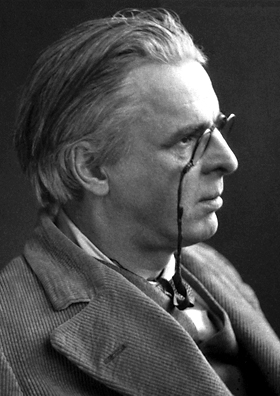Sailing to Byzantium Poem Analysis: A Deep Dive into Yeats' Masterpiece
Sailing To Byzantium
I
That is no country for old men. The young
In one another's arms, birds in the trees,
—Those dying generations—at their song,
The salmon-falls, the mackerel-crowded seas,
Fish, flesh, or fowl, commend all summer long
Whatever is begotten, born, and dies.
Caught in that sensual music all neglect
Monuments of unageing intellect.
II
An aged man is but a paltry thing,
A tattered coat upon a stick, unless
Soul clap its hands and sing, and louder sing
For every tatter in its mortal dress,
Nor is there singing school but studying
Monuments of its own magnificence;
And therefore I have sailed the seas and come
To the holy city of Byzantium.
III
O sages standing in God's holy fire
As in the gold mosaic of a wall,
Come from the holy fire, perne in a gyre,
And be the singing-masters of my soul.
Consume my heart away; sick with desire
And fastened to a dying animal
It knows not what it is; and gather me
Into the artifice of eternity.
IV
Once out of nature I shall never take
My bodily form from any natural thing,
But such a form as Grecian goldsmiths make
Of hammered gold and gold enamelling
To keep a drowsy Emperor awake;
Or set upon a golden bough to sing
To lords and ladies of Byzantium
Of what is past, or passing, or to come.
Introduction: Setting the Stage for Timeless Art
Contents [show]
William Butler Yeats' "Sailing to Byzantium" is a poetic voyage into the heart of art, aging, and the eternal soul. Published in 1928, this poem explores a speaker's yearning to transcend physical decay and find solace in the timeless beauty of art. Let's embark on this journey together.
Sailing to Byzantium: Stanza-by-Stanza Exploration
- Stanza One: A Disillusioned Departure
- The poem opens with an aging speaker expressing disillusionment with the physical world.
- Youthful energy and bodily pleasures have lost their appeal.
- The speaker desires to leave this transient world and embark on a spiritual quest.
- Stanza Two: Seeking Guidance from Sages
- The speaker invokes the wise men of Byzantium, a city renowned for its artistic and spiritual heritage.
- He seeks their wisdom to shed his mortal coil and find a new form of existence.
- This highlights the speaker's yearning for transformation and transcendence.
- Stanza Three: The Golden Bird of Art
- The speaker envisions himself transformed into a golden bird, a symbol of art's enduring nature.
- This bird would perch on a golden bough, singing of the past, present, and future.
- The image embodies the speaker's desire to escape the confines of time through artistic expression.
- Stanza Four: The Soul's Eternal Song
- The speaker asserts that the soul can transcend the limitations of the body.
- Art becomes a vessel for the soul's eternal song, offering solace and wisdom.
- The poem concludes with a vision of the soul finding refuge in the eternal realm of art.
Sailing to Byzantium: Key Themes and Motifs
- Aging and Mortality: Yeats confronts the inevitability of aging and the fear of death. The poem explores the speaker's desire to escape the decay of the physical body and find a form of immortality through art.
- Art and Transcendence: Art is presented as a powerful force that can transcend time and offer a refuge from the ephemeral nature of life. The golden bird symbolizes the enduring power of artistic creation.
- The Soul's Journey: The poem is a metaphorical journey of the soul seeking meaning and purpose beyond the physical realm. Byzantium represents a spiritual destination where the soul can find solace and enlightenment.
- Transformation and Rebirth: The speaker's desire to become a golden bird signifies a longing for transformation and rebirth. This reflects the human yearning for renewal and transcendence.
Sailing to Byzantium: Literary Techniques
- Imagery: Yeats employs vivid imagery, such as the golden bird and the holy city of Byzantium, to create a rich tapestry of sensory experiences.
- Symbolism: The poem is laden with symbolism. The golden bird represents art, Byzantium symbolizes a spiritual realm, and the journey itself is a metaphor for the soul's quest for meaning.
- Allusion: Yeats alludes to historical and mythological figures, such as the sages of Byzantium, to add depth and layers of meaning to the poem.
- Rhythm and Rhyme: The poem follows a structured rhyme scheme and rhythm, enhancing its musicality and emphasizing its thematic unity.
Sailing to Byzantium: Critical Interpretations
- Spiritual Quest: Some critics interpret the poem as a spiritual quest for enlightenment and transcendence.
- Artistic Manifesto: Others view it as an artistic manifesto, celebrating the enduring power of art.
- Personal Reflection: The poem can also be seen as a personal reflection on Yeats' own aging and his search for meaning in art.
Sailing to Byzantium: Legacy and Influence
"Sailing to Byzantium" has left an enduring legacy in the world of literature. It continues to inspire readers and artists with its profound exploration of aging, art, and the eternal soul. The poem's timeless themes and evocative imagery resonate with people across generations.
Conclusion: A Timeless Voyage
In conclusion, "Sailing to Byzantium" is a poetic masterpiece that invites us to contemplate the profound themes of aging, art, and the soul's journey. Yeats' evocative imagery and symbolism create a rich tapestry of meaning, leaving a lasting impression on readers. This poem is a testament to the enduring power of art and its ability to transcend the limitations of time and mortality.

Primary Source:
- Yeats, W.B. "Sailing to Byzantium." The Tower, 1928. This is the original source of the poem itself, essential for any in-depth analysis. 1. Sailing to Byzantium by William Butler Yeats - Poetry Foundation www.poetryfoundation.org2. The Tower (poetry collection) - Wikipedia en.wikipedia.org
Scholarly Books and Articles:
- Bloom, Harold. Yeats. Oxford University Press, 1970. Bloom's book provides a comprehensive overview of Yeats' life and work, including insightful commentary on "Sailing to Byzantium."
- Jeffares, A. Norman. A Commentary on the Collected Poems of W.B. Yeats. Stanford University Press, 1968. This commentary offers detailed analysis of Yeats' poems, including line-by-line interpretations and historical context.
- Vendler, Helen. Our Secret Discipline: Yeats and Lyric Form. Harvard University Press, 2007. Vendler's book delves into Yeats' use of poetic form and its impact on the meaning of his poems. 1. Our Secret Discipline: Yeats and Lyric Form: 9780674026957: Vendler, Helen: Books - Amazon.com www.amazon.com
Online Resources:
- The Poetry Foundation: https://www.poetryfoundation.org/poems/43291/sailing-to-byzantium This website provides the full text of the poem, along with biographical information about Yeats and additional analysis.
- SparkNotes: https://www.sparknotes.com/poetry/yeats/section6/ SparkNotes offers a summary and analysis of "Sailing to Byzantium," focusing on its key themes and literary techniques.
- Wikipedia: https://en.wikipedia.org/wiki/Sailing_to_Byzantium While not a scholarly source, Wikipedia can provide a useful overview of the poem and its historical context.
